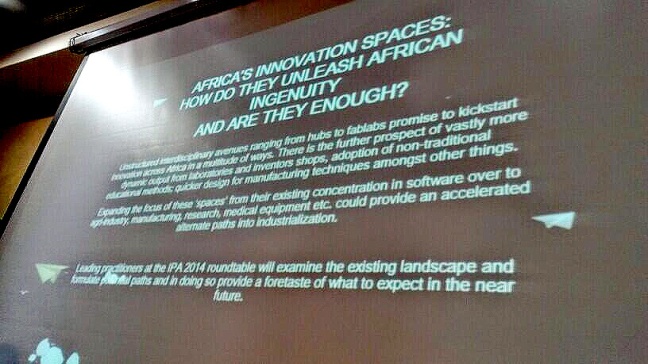“Africa needs meaningful investment to alleviate poverty and provide inclusive prosperity. To achieve this, we need to be able to provide environments that promote quality investment for the people and reduce risks. Forums like the IPA are necessary to make the most of the continent’s investment,” AgriProtein spokesperson David Drew (Winner of IPA 2013)
Typically when the world talks innovation, Africa is not part of that conversation. However, people living on the continent know that is both oversight and misconception: the vicissitudes of daily life in African environments engender strategies and tactics for survival that are radically innovative. Unfortunately, in contradistinction to this reality, a majority of African educational and research institutions underperform at driving innovation to address the challenges of daily life in these same spaces. Too often the emphasis is on “pure” academic research divorced from real-world applications. Or when research does link to applications, that coupling does not include viable implementation plans to bring the ideas to market or to scale. Africa has an abundance of brilliant minds. What is missing is a results-oriented ecosystem to translate indigenous invention into products and services that can transform society. On the evening of October 1st, a dozen young Ghanaian innovators and changemakers joined with the AMP team to welcome Pauline Mujawamariya, Director of Innovation Price for Africa (IPA), at the Hub Accra.
Now in its fourth year, the prize continues to increase its profile globally, the size of it’s pan-African community of innovators and concomitant capacity to shift the conversation about innovation in Africa. An emerging force in the global innovation discourse, the IPA prize — an initiative of the African Innovation Foundation — provides support for significant inventions by Africans in Africa, not just to honour the winners for their ingenuity, but to help their inventions become true innovation through market-based delivery. This year’s winners were Dr Nicolaas Duneas and Nuno Pires from South Africa, who developed an Osteogenic Bone Matrix (OBM), the first of its kind in the world. This invention is straight out of science fiction: “The OBM injection leads to the rapid, safe and effective healing of problematic bone injuries, leading to the complete and natural restoration of the bone, including the bone marrow.” (1) Yes, that means an injection that makes bones regenerate.
IPA 2013 winner AgriProtein went on to raise “$11 million from strategic partners to commercialize and globalize its IP.” (2)

After setting up the bamboo furniture “living-room style”, we dove deep into a two-hour long discussion about the nature and future of African innovation. Pauline gave a brief overview of what the Innovation Prize for Africa was about and then engaged attendees — all either founders of or actively involved in technology start-ups — as they asked questions about the IPA prize, shared their personal experiences and the challenges of youth-led entrepreneurship in Ghana and West Africa. Topics ranged from “problems”, i.e. social and cultural factors that inhibit innovation, to countermeasures that can lead to solutions (over time).
Far from being a talk shop of hopeless complaints, one could sense a joint resolve to take these insights and turn them into action. The atmosphere was charged with electric potential energy.
One part of the conversation worth sharing… We debated whether the IPA Prize reinforces the “false myth” of innovators as lone geniuses, when in reality, innovation occurs through the interconnected efforts of groups of people (networks), not just individuals. Could not the IPA be more effective if it supported technology clusters or collaborative projects? Pauline’s response was that while innovation is a joint venture, leaders still play an instrumental role in making innovation happen. The IPA Prize seeks to ensure that pioneers receive the attention and support that can enable them to facilitate the massively-scaled change that the continent needs so urgently.
Which leads us to… Applications for the IPA Prize — which awards $150,000 in total to winners — are due at the end of this month. Already around the social web, we are seeing retweets and Facebook shares encouraging people to “Apply to the prize!” This is great, and we support it. You SHOULD apply. It’s more than about simply winning. Going through the process of applying, or even talking about applying, can serve to remind you that you can be and likely ARE an innovator already. Everything starts in the mind, and once you see the power you have to affect change, it becomes infinitely easier to make it happen.
But we want to add something else: Encourage other people around you to apply! African culture is predicated on the concept of community. When you raise up one person, you raise up everyone. YOU know the people around you doing amazing things. Even if there is no direct benefit for you, encourage those people in your circles and networks who you admire — who inspire you — to apply to the IPA prize. Sometimes people may not even see how amazing what they are doing is. They need someone else to help them see it. This applies especially to youth under the age of 25. Talk to the “whiz kids” that you know that have created things — just because they wanted to — but which they may not see as inventions.
The deadline for entry is 31st October, 2014 and we hope to see as many youth (under the age of 25) and women as possible enter and win the prize. Together we can redirect the conversation around innovation in Africa.

Pauline Mujawamariya has worked with international organisations such as UNICEF and GTZ prior to IPA. In her current capacity as IPA Director, she travels the length and breadth of the continent, recruiting a large-scale network of innovators who will — one creative step at a time — help transform the entire African continent. More pictures of the event on Flickr.
___
(1) http://innovationprizeforafrica.org. [accessed 1st October 2014].
(2) http://www.agriprotein.com. [accessed 1st October 2014].

